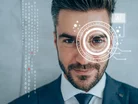Top 10 ways biometric technology can support healthcare

One day, keys and passwords will be obsolete, with access to buildings, electronic equipment and even countries granted by biometric technology: fingerprint recognition, facial identification or retina scan, unique to the user.
Biometric technology is being installed across various industries such as the financial sector and transport industry, although the use of identification through fingerprint dates back centuries. Modern biometrics was inspired by French anthropologist Alphonse Bertillon, who created The Bertillon System (1879) which involves police photographing criminals and detailing their personal characteristics, a technique which is still used in mugshots.
One sector where biometric technology has really taken off, is in healthcare. Here’s why…
10. Access made easier and safer
As with any new technology, there are many objections to the use of biometric security in any company. But pen and paper were once innovative, the car and the internet were wild ideas. The invasion of privacy is cited as the biggest concern, but responsible companies will keep biometric data safe.
EyeLock explains more:
9. Makes life easier for healthcare staff
With biometric security - you can’t lose your fingerprint, your facial recognition can’t be stolen and your retina scan can’t be borrowed by an unreliable colleague.
Healthcare staff have a lot to think about and the reduced volume of personal admin (keys and passwords), will make life a little bit easier for stretched staff, like those at Samsung.
8. Prevents tailgating
Security company Alcatraz AI prevents unauthorised entry via tailgating, with its facial biometric access solution.
“Our access control solution gives security teams the ability to not only detect and respond to tailgating in real-time, but to prevent it, as well,” said Tina D’Agostin, CEO of Alcatraz AI.
7. Digital trail of employee whereabouts
When employees sign in or out of a building or event manually, they may edit the exact time. With biometric security sign in, it is not possible for employees to do this. Their digital footprint is tightly recorded - which is one of the reasons behind the objections to biometric security.
Suprema demonstrates how authentication works.
6. Secured for staff and patients
A biometric partnership between IDEMIA and Bosch has been arranged with top security in mind.
“When our customers are going to deploy biometric terminals for their security, they will be installed for years so we want to offer them the best option,” said Gregor Schlechtriem, of Bosch.
“Our biometric devices will be a strong offering for companies looking for a high level of security and user convenience,” said Yves Portalier, Idemia.
5. Stops opportunistic staff from breaking the law
It’s not just tailgating where biometric security can help to protect a building. The digital footprint also helps organisations keep track of who is where - and when. If expensive items go missing, biometric security data can trace back individuals who may have been a witness, or responsible for the theft.
NEC shares more on how this works.
4. Reduces germs
Research shows that cards and card readers carry more germs than urinals. Security cards carried around by nursing staff and used multiple times daily can transfer germs, but hands-free biometric security do not.
However, for biometric finger scanning, this proposes the same problem. HFX navigates this problem with antibacterial wipes.
3. Combats fraud
Another form of biometric security is voice identification. Software development company Nice has a Enlighten Fraud Prevention system, which uses voice biometric-powered fraud detection, for use in contact centres.
‘The Nice Enlighten Fraud Prevention proactive system significantly reduces losses incurred through fraud as well as reduces handling time while protecting consumers’ said the company in a statement.
2. Reduces likelihood of theft of medicine, equipment or personal belongings
Sometimes hospital ‘visitors’ are not visiting a person at all, but are treating the facility with a dark motive. Medicine and equipment stored in the building can be stolen and sold on, but the people being taken care of in a hospital are of the highest value. Newborn babies are a target and biometric security means parents know that their newborns are being protected.
1. Helps patient’s feel secure
In a healthcare facility, the patients are the priority. When a patient is receiving treatment, or supporting a loved one who is unwell, knowing that the hospital has installed the best in biometric security, will help them feel at ease.
As explained by UiPath, facial recognition software can not only help ensure that healthcare workers have a more efficient day at work, but the patient process can run smoother too.














